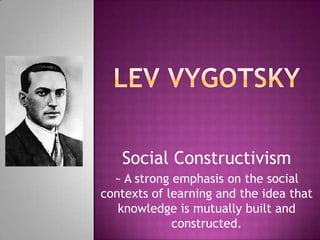Vygotsky
•Download as PPTX, PDF•
8 likes•3,304 views
Vygotsky
Report
Share
Report
Share

Recommended
Recommended
More Related Content
What's hot
What's hot (20)
Viewers also liked
Viewers also liked (20)
Constructivism: How to Use It to Improve YOUR Teaching and Learning

Constructivism: How to Use It to Improve YOUR Teaching and Learning
Similar to Vygotsky
Work Education- Lev VygotskyPsychological Basis for Work in Education- Vygotsky.pptx

Psychological Basis for Work in Education- Vygotsky.pptxDr. Peeyush Kamal, Jamia Millia Islamia - Faculty of Education
Similar to Vygotsky (20)
Psychological Basis for Work in Education- Vygotsky.pptx

Psychological Basis for Work in Education- Vygotsky.pptx
Lev vygotsky and his work on cognitive development

Lev vygotsky and his work on cognitive development
Presentation1 final.pptx of fwhgvsxyxwegjhwvxggwefdyvj

Presentation1 final.pptx of fwhgvsxyxwegjhwvxggwefdyvj
Recently uploaded
God is a creative God Gen 1:1. All that He created was “good”, could also be translated “beautiful”. God created man in His own image Gen 1:27. Maths helps us discover the beauty that God has created in His world and, in turn, create beautiful designs to serve and enrich the lives of others.
Explore beautiful and ugly buildings. Mathematics helps us create beautiful d...

Explore beautiful and ugly buildings. Mathematics helps us create beautiful d...christianmathematics
Mehran University Newsletter is a Quarterly Publication from Public Relations OfficeMehran University Newsletter Vol-X, Issue-I, 2024

Mehran University Newsletter Vol-X, Issue-I, 2024Mehran University of Engineering & Technology, Jamshoro
Recently uploaded (20)
Unit-V; Pricing (Pharma Marketing Management).pptx

Unit-V; Pricing (Pharma Marketing Management).pptx
This PowerPoint helps students to consider the concept of infinity.

This PowerPoint helps students to consider the concept of infinity.
Python Notes for mca i year students osmania university.docx

Python Notes for mca i year students osmania university.docx
Basic Civil Engineering first year Notes- Chapter 4 Building.pptx

Basic Civil Engineering first year Notes- Chapter 4 Building.pptx
Explore beautiful and ugly buildings. Mathematics helps us create beautiful d...

Explore beautiful and ugly buildings. Mathematics helps us create beautiful d...
Mixin Classes in Odoo 17 How to Extend Models Using Mixin Classes

Mixin Classes in Odoo 17 How to Extend Models Using Mixin Classes
Food safety_Challenges food safety laboratories_.pdf

Food safety_Challenges food safety laboratories_.pdf
ICT role in 21st century education and it's challenges.

ICT role in 21st century education and it's challenges.
Vygotsky
- 1. Lev Vygotsky Social Constructivism ~ A strong emphasis on the social contexts of learning and the idea that knowledge is mutually built and constructed.
- 2. Zone of Proximal development (zpd) The range of tasks a child can learn with guidance. The lower limit signifies the child’s skill level when working alone, while the upper limit is the level they can attain when working with an instructor. This is called developmentally appropriate teaching, because you are acknowledging that every child is at a different stage in their development. (Santrock, 52)
- 3. Scaffolding The instructor adjusts their level of support/guidance to accommodate for the child’s current performance If the child is performing in the upper limits of the ZPD, less guidance is needed; But, they can step in when they feel the child can no longer advance with support Scaffolding - it’s just how it sounds!!
- 4. Language and thought Children use speech to help them solve problemsand to plan, guide, and monitor their behaviour Private speech – children talk aloud to themselves Vygotsky argues that private speech can play a positive role in a child’s development, as it makes them more socially adept Language has a strong role in shaping thought. In Vygotsky’s opinion, the two develop independently, but then merge.
- 5. How can you (as an educator) apply Vygotsky’s theories to your classroom? Determine the child’s ZPD by presenting them with tasks of varying difficulty and assessing their skill level based on their performance Educate in the child’s upper-limit of ZPD to help them improve their skill level. Provide support and encouragement. Assign homework that caters to the child’s lower-limit so they are able to do it Pair children with peers of a higher skill and/or age level Encourage private speech Make learning meaningful; apply it to real-world settings Use cultural tools; develop self-regulation; ZPD; Scaffolding; private speech; shared activity; and encourage play as an important component of a child’s development
- 6. Source: Santrock, J. W. (2011). Educational Psychology (5th ed.). Cognitive and Language Development (pp. 50-57). New York, NY: McGraw-Hill.